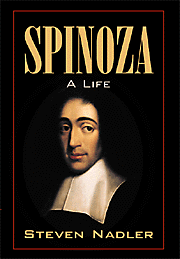Book contents
- Frontmatter
- Contents
- Acknowledgments
- Preface
- 1 Settlement
- 2 Abraham and Michael
- 3 Bento/Baruch
- 4 Talmud Torah
- 5 A Merchant of Amsterdam
- 6 Cherem
- 7 Benedictus
- 8 A Philosopher in Rijnsburg
- 9 “The Jew of Voorburg”
- 10 Homo Politicus
- 11 Calm and Turmoil in The Hague
- 12 “A free man thinks least of all of death”
- A Note on Sources
- Notes
- Bibliography
- Index
- Plate section
3 - Bento/Baruch
Published online by Cambridge University Press: 05 August 2013
- Frontmatter
- Contents
- Acknowledgments
- Preface
- 1 Settlement
- 2 Abraham and Michael
- 3 Bento/Baruch
- 4 Talmud Torah
- 5 A Merchant of Amsterdam
- 6 Cherem
- 7 Benedictus
- 8 A Philosopher in Rijnsburg
- 9 “The Jew of Voorburg”
- 10 Homo Politicus
- 11 Calm and Turmoil in The Hague
- 12 “A free man thinks least of all of death”
- A Note on Sources
- Notes
- Bibliography
- Index
- Plate section
Summary
In 1677, shortly after Spinoza's death, Jean Maximilian Lucas, a French Protestant refugee living in Holland, began writing his La Vie et l'esprit de Monsieur Benoit de Spinosa. Lucas was about the same age as Spinoza and had known him personally. In the opening of his book, he summarizes practically all that we know for certain of Spinoza's earliest years: “Baruch de Spinoza was born in Amsterdam, the most beautiful city of Europe.” Johan Köhler (or Colerus, as he has come to be known), a Lutheran minister from Dusseldorf who lived in The Hague at the end of the seventeenth century and who was Spinoza's other early biographer, supplies one or two additional facts: “Spinoza, that philosopher whose name makes so great noise in the world, was originally a Jew. His parents, a little while after his birth, named him ‘Baruch’…. He was born at Amsterdam on the twenty-fourth of November in the year 1632.” Unlike Lucas, who was sympathetic to Spinoza and an admirer of his ideas (referring to him as his “illustrious friend”), Colerus – like most of his contemporaries – was hostile to his subject, although that did not keep him from trying to produce as complete and accurate a biography as possible. Still, he could not compensate for the dearth of extant information on the circumstances and events of Spinoza's boyhood.
If Spinoza was born on November 24, 1632, then, like all Jewish males, he would have received his name at his circumcision ceremony, or brit milah, eight days later, on December 1.
- Type
- Chapter
- Information
- SpinozaA Life, pp. 42 - 60Publisher: Cambridge University PressPrint publication year: 1999



